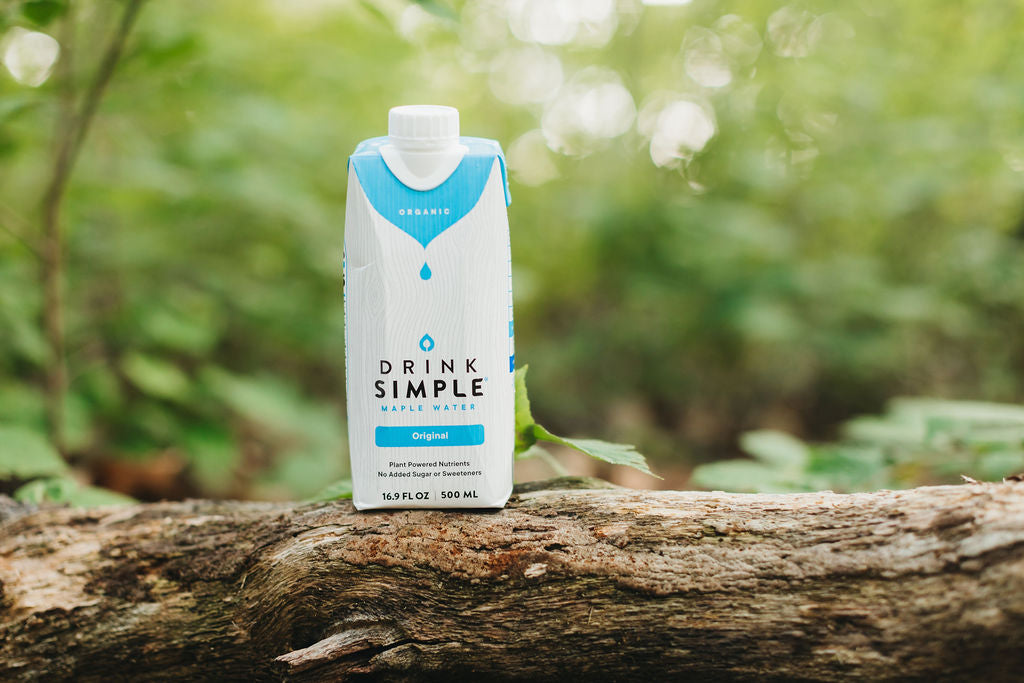
Benefits of Maple Water For Performance & Health
I’ve been a fan of this New England beverage for years now, but when I bring it up, I usually hear “what is maple water”?! So, I partnered with Drink Simple to share the many benefits of maple water for performance and health, as well as ways to use it!
Benefits of Maple Water for Performance
As a sports dietitian, I of course need to start with the physical performance benefits of maple water, especially since I personally enjoy it during long training sessions. While it’s no secret that adequate carbohydrate intake supports training and performance, research studies have been conducted to support the benefits of maple water, specifically.

Helps maintain energy levels
Carbohydrate is the primary source of fuel during moderate to intense exercise, as using the storage form of it (glycogen) in our muscles is the most efficient way to produce energy. Even if you begin a long training session with enough carbohydrate, though, 90 minutes in, your blood sugar levels will start to drop, decreasing your intensity, your time to exhaustion, and your mental energy levels, too. On top of that, carbohydrate helps keep you hydrated during exercise, so replenishing carbs during your runs, rides, swims, or long training sessions incorporating strength training is helpful. Maple water offers 6 grams of carbohydrate per eight ounce serving. This is less than standard sports drinks, but may be helpful for those who’s digestive tracts react negatively to higher carbohydrate solutions and can be a great option for those who like to choose foods to fuel their training and need an easily absorbable carbohydrate boost in their beverage. Maple water is also a great option for shorter high intensity workouts under a variety of conditions. When I was pregnant, for example, my blood sugar would dip quickly during exercise, so I never headed to a workout without maple water (it was also the star of my hospital bag for delivery)!
May support enhanced hydration
A study published in the Journal of the International Society of Sports Nutrition (JISSN) suggested that maple water has a potential for enhanced rehydration, since participants were still thirsty following maple water intake vs a control. Research has shown that thirst is typically alleviated before complete rehydration, which can result in active individuals failing to adequately rehydrate after exercise. In their study, while statistical significance wasn’t reached, there were positive trends for maple water in regards to urine specific gravity and osmolality, important markers of hydration, on top of the significant difference in thirst, likely due to the greater electrolyte and nutrient content.
On top of this the applied physiology lab at UNT found maple water to be twice as hydrating as plain water after exercise. In a small study, participants were dehydrated during 45 minutes of activity in a heat chamber. When drinking maple water, they were rehydrated 30 minutes post-activity versus 60 minutes with plain water.
May improve aerobic exercise performance
Drink Simple collaborated with kinesiology researchers at The University of Louisiana, Lafayette (now at UNC) to investigate some of the potential benefits of maple water for performance. In their first of two small studies, they found improved oxygen consumption (VO2) abilities during exercise with maple water versus a placebo. VO2 Max, or the maximal amount of oxygen one is able to consume during exercise of increasing intensity, is a representation of the body’s ability to use oxygen for energy metabolism in muscle cells. Greater VO2 Max correlates with greater energy production, and therefore enhanced aerobic exercise performance – it’s actually used as a measure of cardiovascular fitness! This study is new and is not yet published, but I’m already excited for larger follow-up studies to further confirm this benefit.
Offers antioxidants to aid recovery
Intense exercise, whether endurance or strength focused, results in excess oxidative stress for the body. While some oxidative stress is a normal part of aging processes, excess amounts can increase inflammation, limit recovery from exercise, and increase risks of chronic diseases. Our diet has the ability to help us combat excess oxidative stress by delivery of a variety of antioxidants. While some vitamins and minerals are antioxidants, most are compounds referred to as phytochemicals, which there are tens of thousands of. The first study I mentioned that was published in JISSN found maple water, as expected due to it’s nutrient content, to have a higher antioxidant potential than the control. Supporting this, the UL-Lafayette researchers concluded that versus their control, maple water provided a reduction in inflammation. While some inflammation, or stress, to muscle cells is important to stimulate repair processes, limiting excess inflammation may have the ability to enhance recovery.
